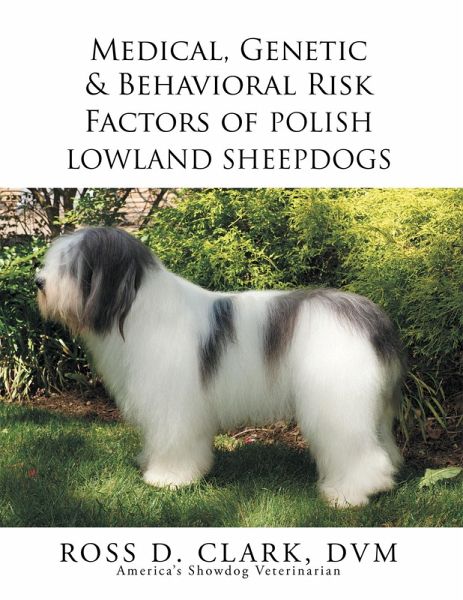
Medical, Genetic & Behavioral Risk Factors of Polish Lowland Sheepdogs (eBook, ePUB)

PAYBACK Punkte
1 °P sammeln!
This book (the Polish Lowland Sheepdog) provides you with a through description and positive attributes of this breed including origin, purpose, history, normal heights and weights, acceptable colors and behavioral traits. Our books differ from most books on dog breeds because this book also provides you with a comprehensive and authoritative source of all the known predisposed hereditary health syndromes for the breed. You will find extensive references for each problem described. We also provide the breed club address for this breed and a list of laboratories and organizations that can provi...
This book (the Polish Lowland Sheepdog) provides you with a through description and positive attributes of this breed including origin, purpose, history, normal heights and weights, acceptable colors and behavioral traits. Our books differ from most books on dog breeds because this book also provides you with a comprehensive and authoritative source of all the known predisposed hereditary health syndromes for the breed. You will find extensive references for each problem described. We also provide the breed club address for this breed and a list of laboratories and organizations that can provide professional help and information. As a small animal veterinarian, I have always been intrigued by the way dogs have been bred to fill a purpose in life and further impressed that they also tend to love performing that service. Greyhounds and other sight hounds are built for speed with aerodynamic bodies consisting of small head, deep chest, narrow waist and large leg muscles. On the other hand Dachshunds take their name from German words meaning badger dog and they use their long nose, long body and short legs to both track, enter and dig into badger dens. After developing a practice that catered to clients with show dogs, my interest in each breed continued to grow as I studied and observed more and more about the unique predisposition and incidence of health problems in each breed. Breeders of purebred dogs for show were a challenge and inspirational for me to research and help them with their unique health problems. Historically references to hereditary problems are scattered throughout various Veterinary medical texts and journals such as ophthalmology, neurology, gastroenterology, cardiovascular and dermatology. This book, as well as the other books and articles I have written, is researched and compiled with the intention to provide both veterinarians and dog owners with comprehensive and authoritative predisposition information under the breed name. At the date of this publication, The American Kennel Club Canine Health Foundation and the The Kennel Club of England reports over 400 known hereditary health syndromes throughout the dog kingdom. At the writing of my first book in 1983, less than 50 hereditary issues are able to be predicted and or diagnosed. Sequencing of the canine genome, DNA tests, metabolic testing including blood tests and urine testing; plus, phenotypic examinations such as radiographs, ultrasound, and CERF or OFA eye registry exams by a Board Certified Veterinary Ophthalmologist have advanced the science of breed related health and behavioral problems. This book will provide veterinarians, researchers, pet owners and breeders with a comprehensive guide to all the known problems veterinarians and dog owners should consider during pet selection and throughout each life stage of our canine friends.
Dieser Download kann aus rechtlichen Gründen nur mit Rechnungsadresse in A, D ausgeliefert werden.



